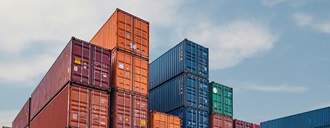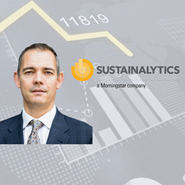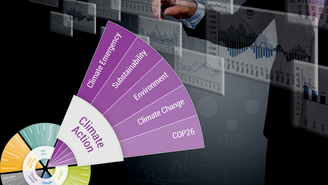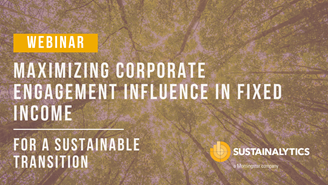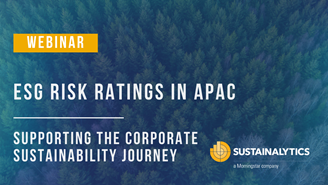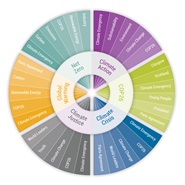What You Don’t Know Can Hurt You: Getting to the Bottom of Supply Chain Risk
To address supply chain risk, business leaders must consider an increasingly broad range of factors in procurement, including environmental, social and governance (ESG) impacts. Investors, customers, and regulators are applying substantial pressure on companies to reduce risks like labor disruptions, workforce health and safety incidents, human rights issues, and shortages of natural resources.
How a Leading Infrastructure and Facilities Conglomerate Successfully Linked its Sustainability Ambitions to its Financing
In pursuing a sustainability-linked loan (SLL) and obtaining a second-party opinion on the KPIs tied to it, Downer secured credibility for its sustainability commitments, while also achieving its financing objectives.
How a Credit Union Analyzed Its ESG Gaps and Set Its Sights on Leading in ESG
The insights and data gathered from Sustainalytics’ ESG Performance Analytics reinforced First West Credit Union’s values-based approach to business and spurred the company to strive for additional positive impacts within its operations, for its members, and for its community teams.
5 Sustainability Themes to Expect in 2022
As we enter 2022, it struck me that VUCA--a concept that originated in the mid-1980s at the U.S. Army War College to describe the volatility, uncertainty, complexity, and ambiguity of the world after the Cold War—is still a useful framework to think of where we are now.
Sustainalytics CEO Michael Jantzi on the Evolution of ESG and What's Ahead For Sustainable Investing
Michael Jantzi is one of the giants of sustainable investing. He is the founder and long-time CEO of Sustainalytics, which was recently sold to Morningstar, and where he now focuses on the big picture as managing director for ESG strategy.
Infographic | How Today’s Banks are Adopting ESG-Based Strategies to Become More Sustainable
Banks need comprehensive and credible environmental, social, and governance (ESG) strategies to participate in and benefit from the accelerating growth of sustainable finance. This infographic sheds light on some of the key sustainability-focused strategies banks are using and what they might look like in practice.
For Investors with Ambitions to Lead on Climate Action Post COP26
In the weeks following COP26, investors in the UK and worldwide face a myriad of upcoming climate-related regulations heading towards the implementation phase. In addition, major global coalitions such as the Glasgow Financial Alliance for Net Zero have sprung up to attempt to accelerate decarbonization via targeted investment.
Q&A | Financing the Future: An Interview on Banks’ Role in the Green Transition
Financing the Future: Conversations in Sustainable Finance is a Q&A series where we sit down with featured ESG experts from Sustainalytics, sharing their insights on how businesses are using finance to meet the challenges of our transition to a sustainable future. Read on to learn...
A Closer Look at Product Governance ESG Risk Management
In 68% of our engagements, product governance is a significant material ESG issue, but it is our experience that most companies underestimate the materiality of this risk to investors. For some industries, product governance represents on average more than 20% of ESG risk exposure, as identified within our ESG Risk Rating framework.
Sustainable Finance and Banks: Reduced Risk, Increased Opportunity
Banks will play a key role in the green transition and those that commit to sustainable banking may gain an advantage over competitors, among other benefits. Indeed, banks are uniquely positioned to participate in and benefit from the transition to a green economy.
COP 26: A Spotlight on Emerging Climate Action Themes for Investors
Reactions to the COP26 Conference and the resulting Glasgow Climate Pact have predictably run the gamut from claims of greenwashing to the celebration of progress in the fight against climate change. Ultimately, any judgement on COP26 may be premature, as the success of the conference will best be measured in time by the extent to which commitments made are put into motion. While we wait to see the concrete actions that materialize, the past two weeks have underscored the importance of several themes that will garner increasing attention and should be considered by sustainable investors.
Infographic | 5 Breakout Innovations in Sustainable Finance for Banks
This infographic describes five key innovations in sustainable finance, including green deposits, sustainable deposits, green trade loans, green guarantees and letters of credit, sustainable supply chain financing, and offerings for borrowers in industries not traditionally considered green.
What’s Happening in Sustainable Finance: Market Expectations Rise, Green Bonds Continue to Flourish, and Biodiversity Climbs Up the Agenda
Highlighting the growth of the global sustainable finance market during the first half of the year and the increasing attention on biodiversity among issuer and investors.
